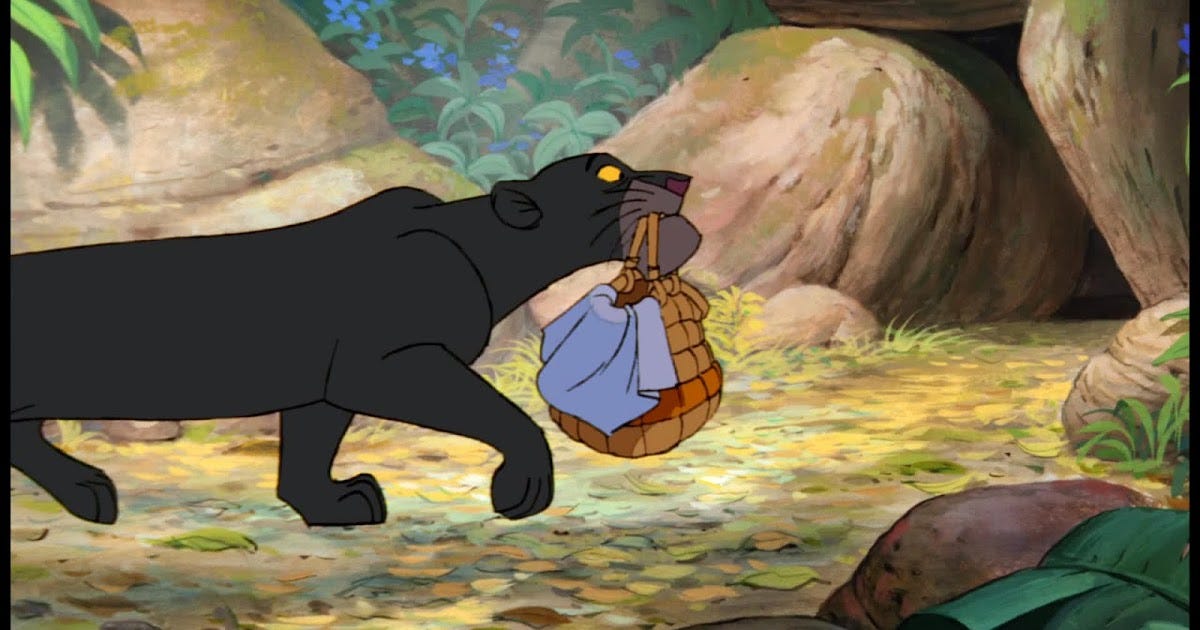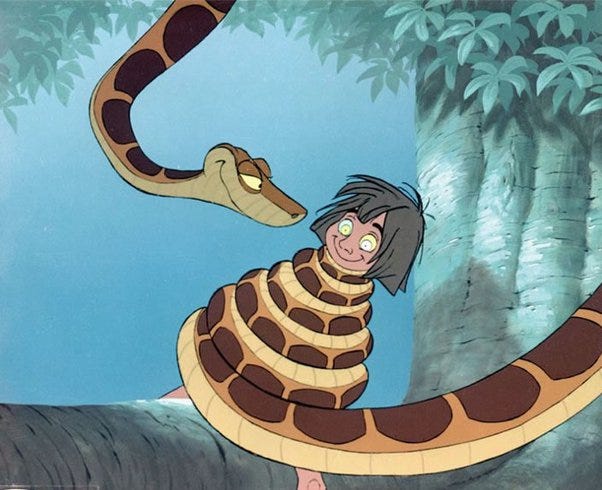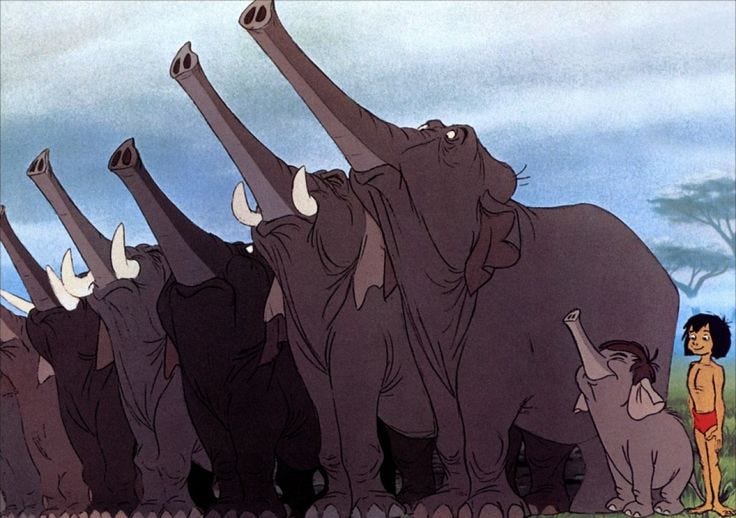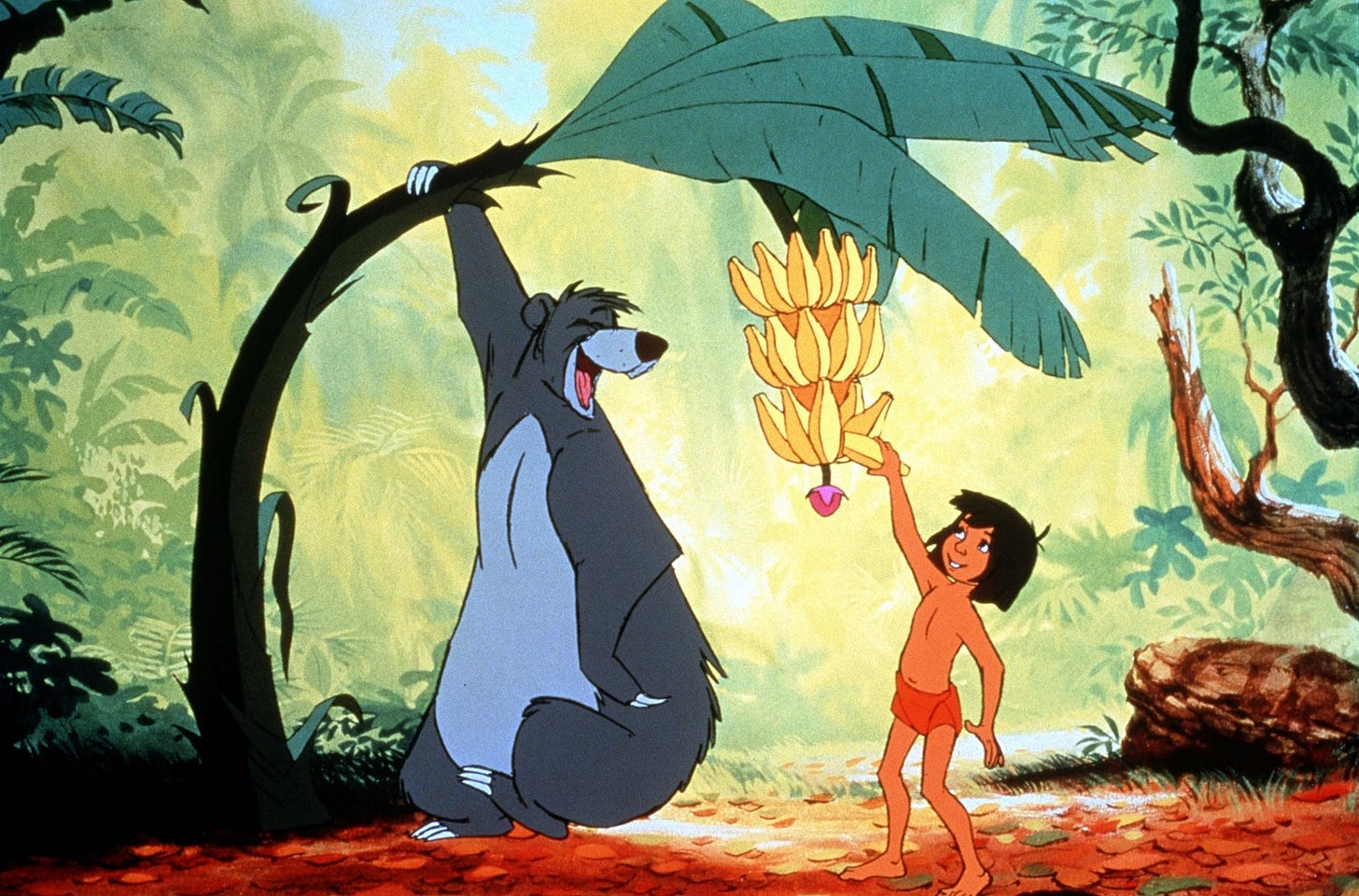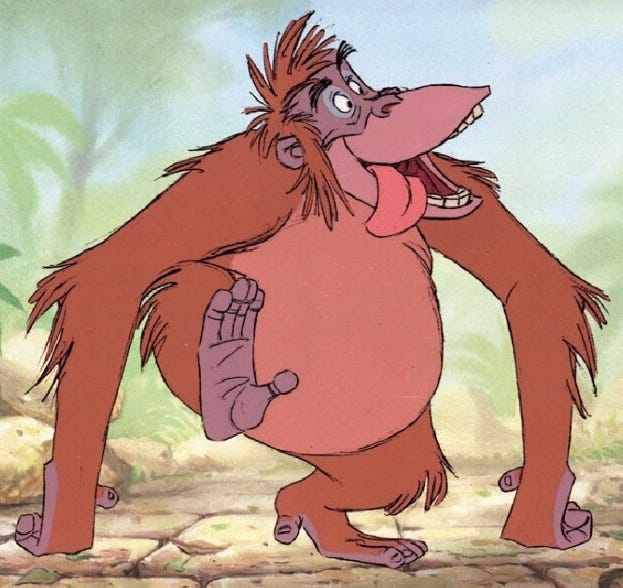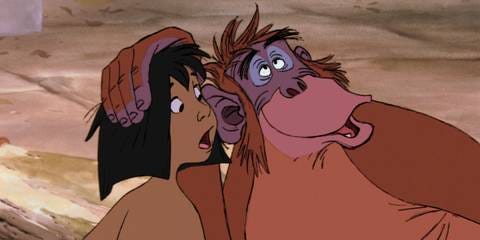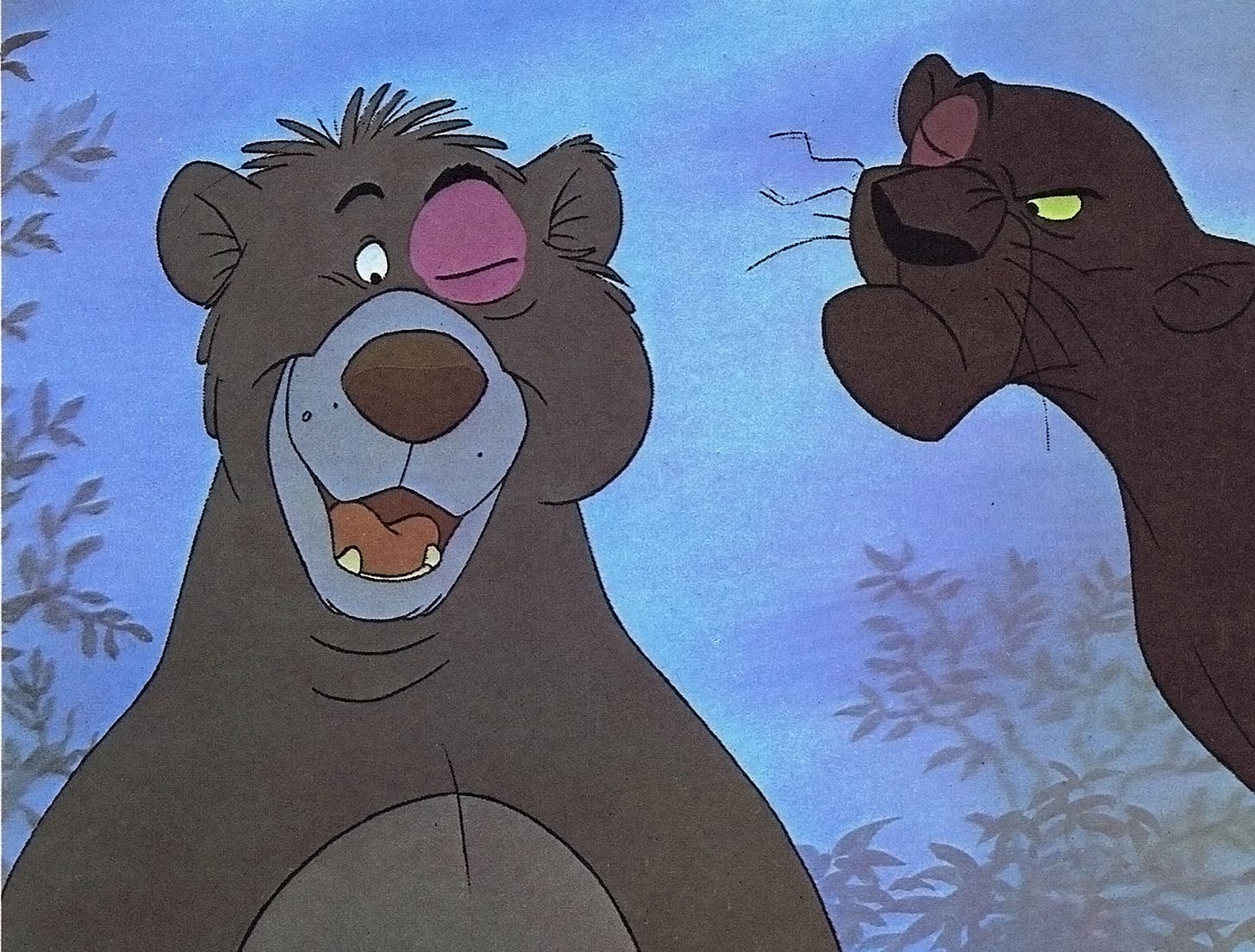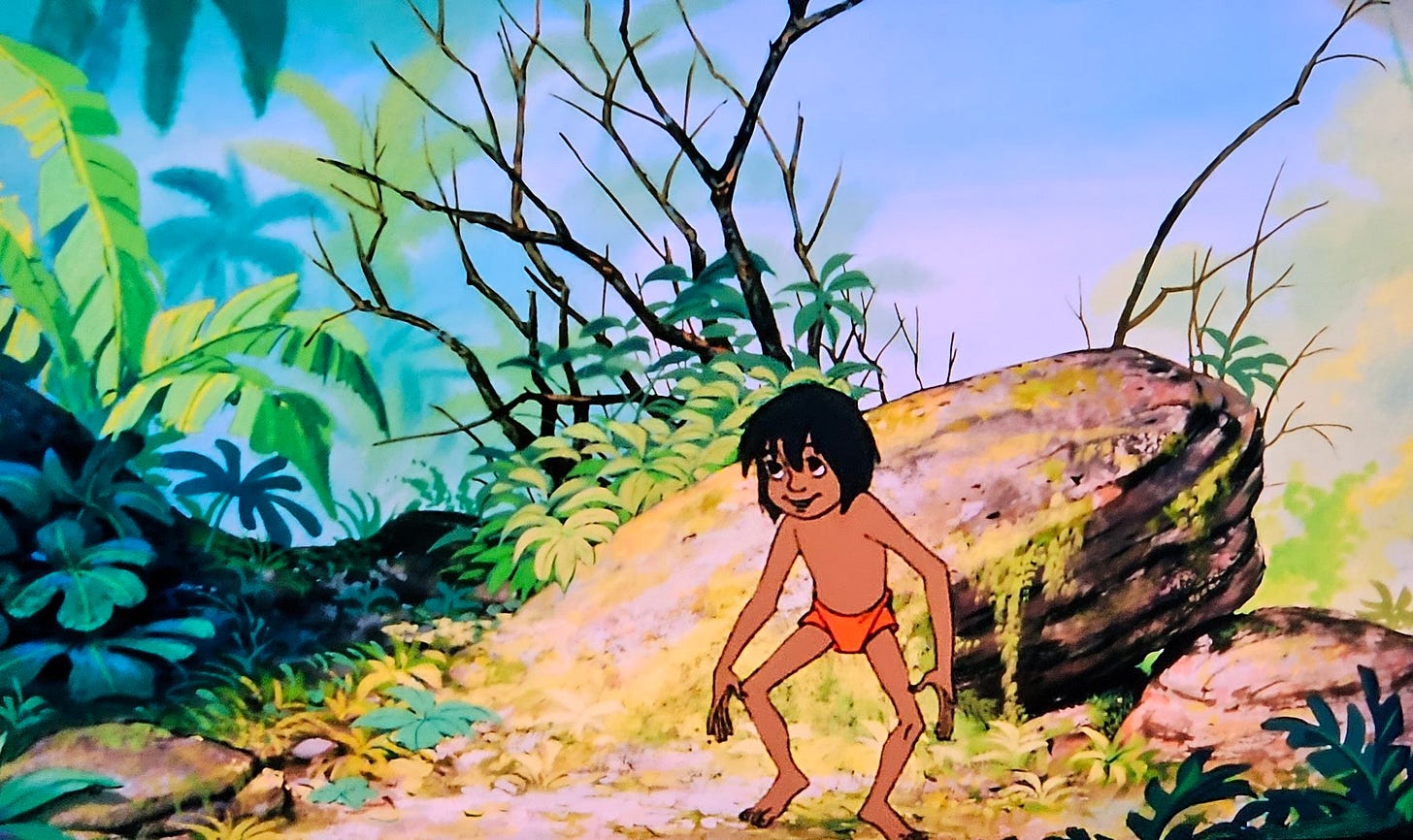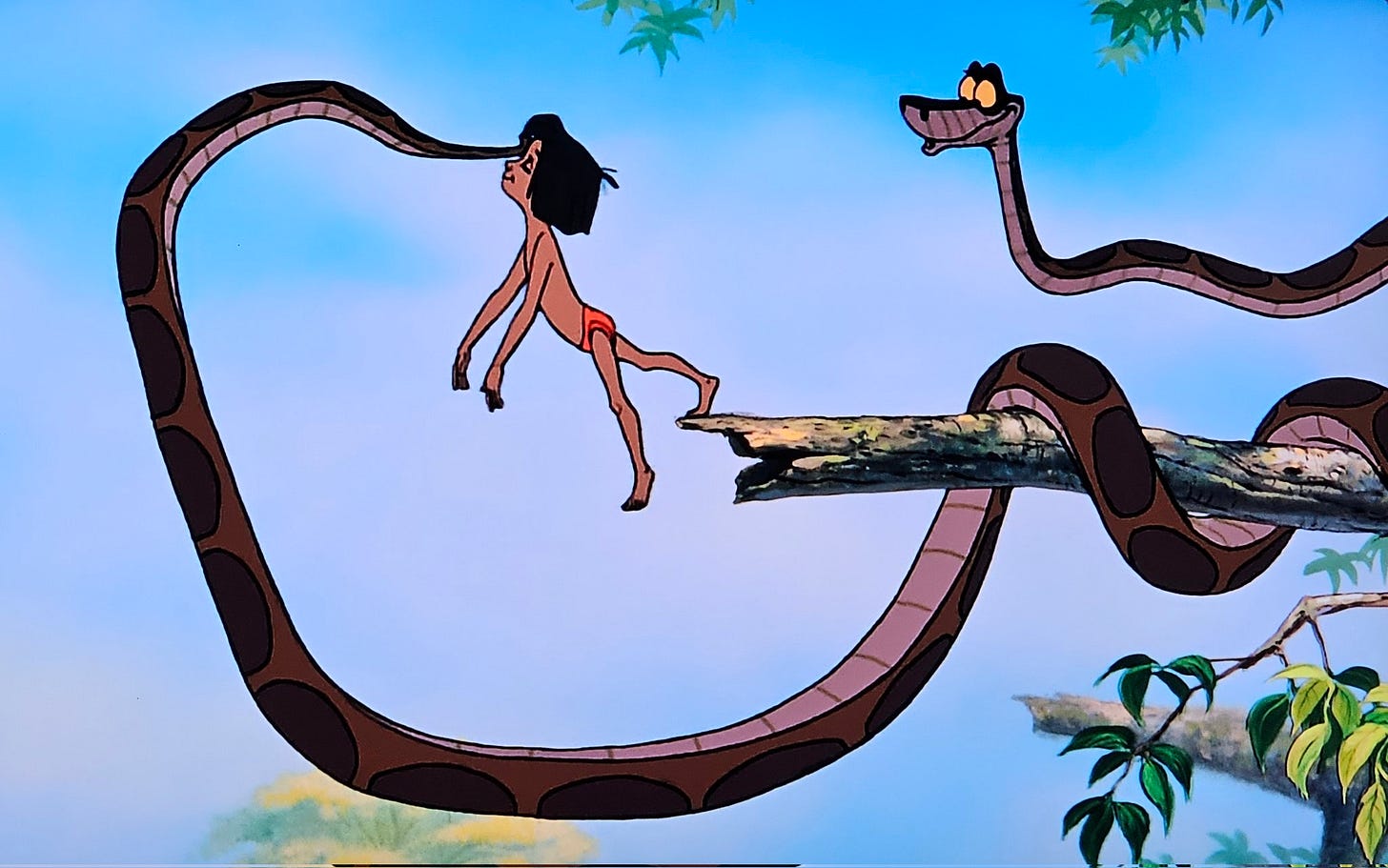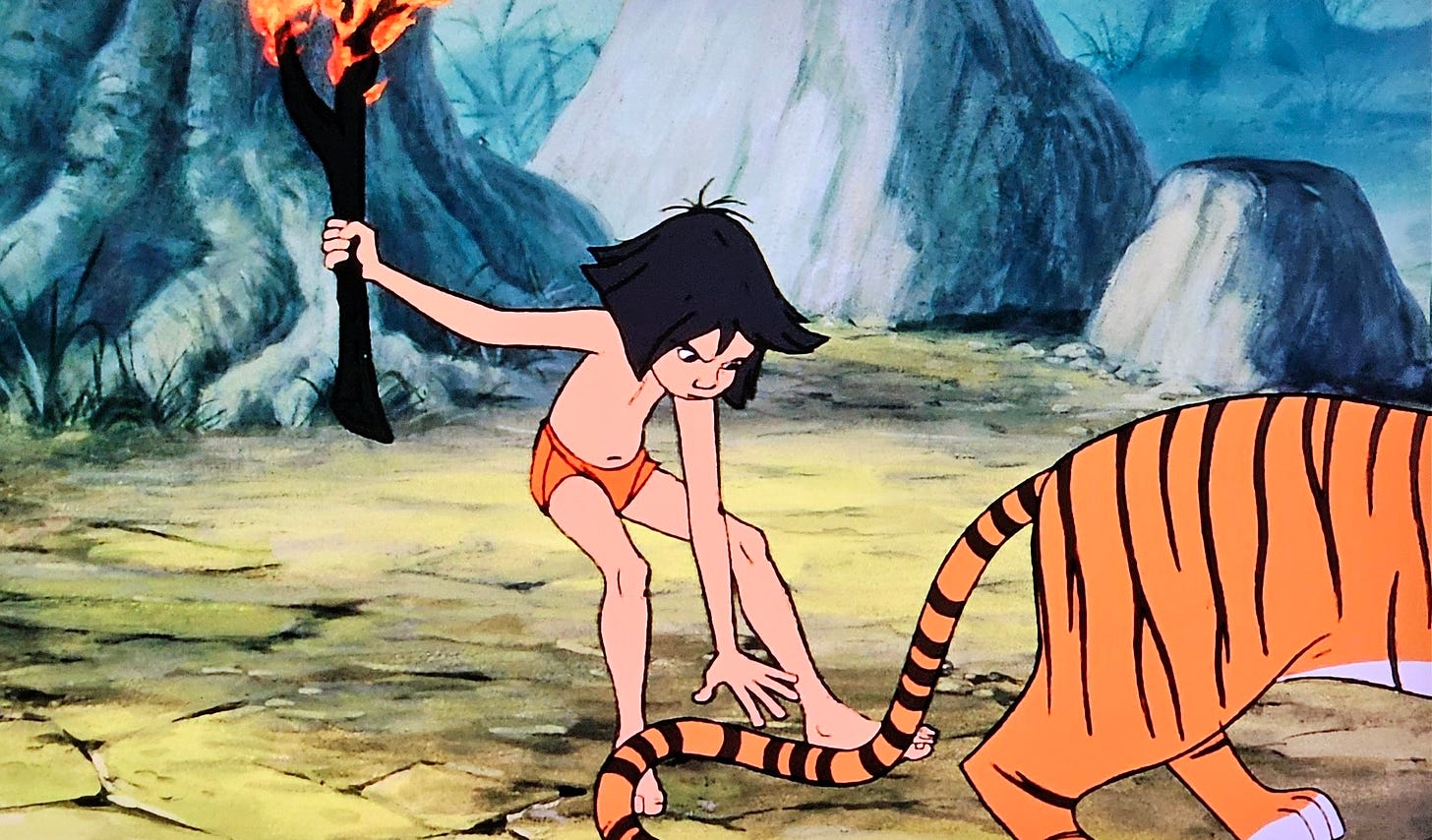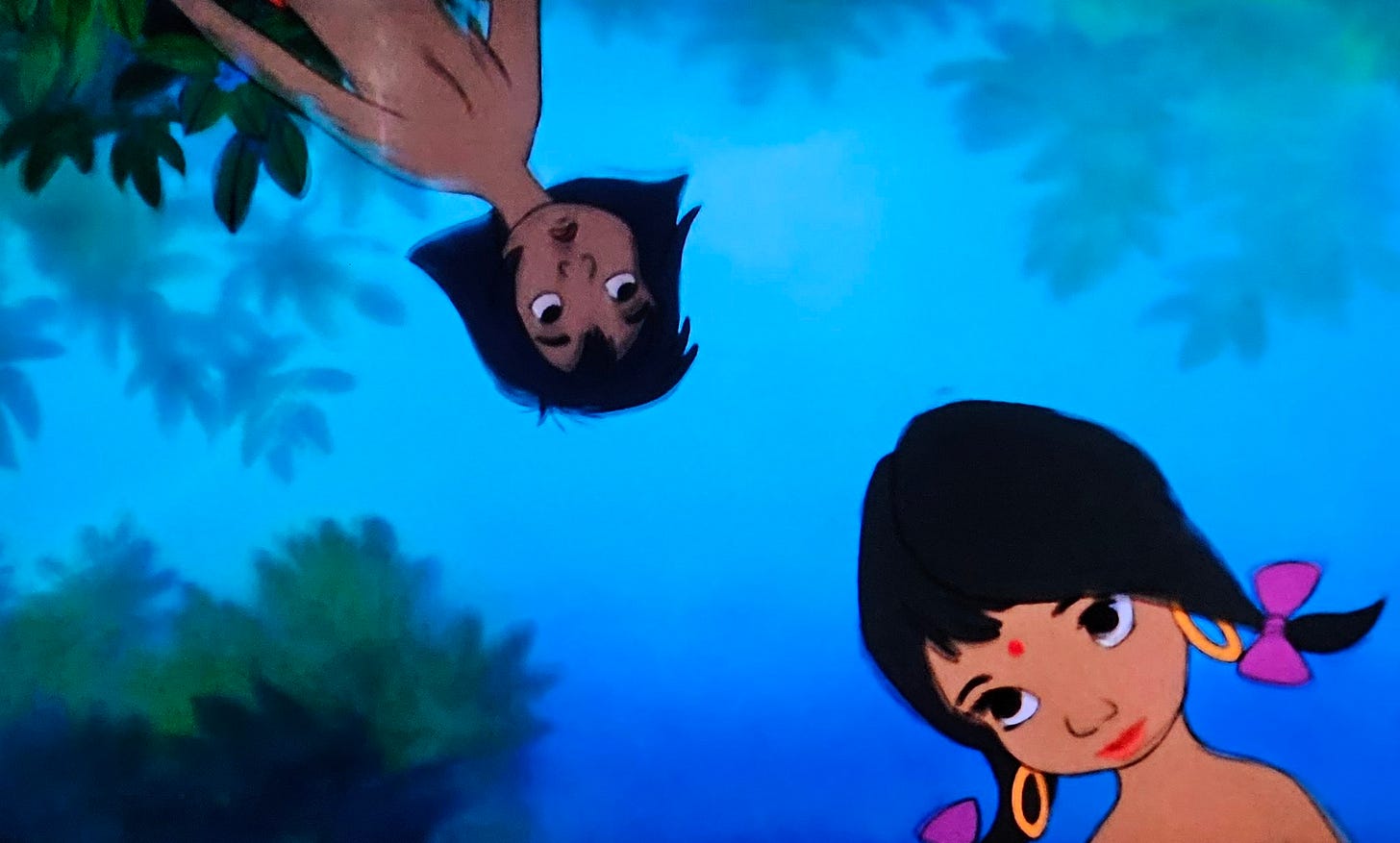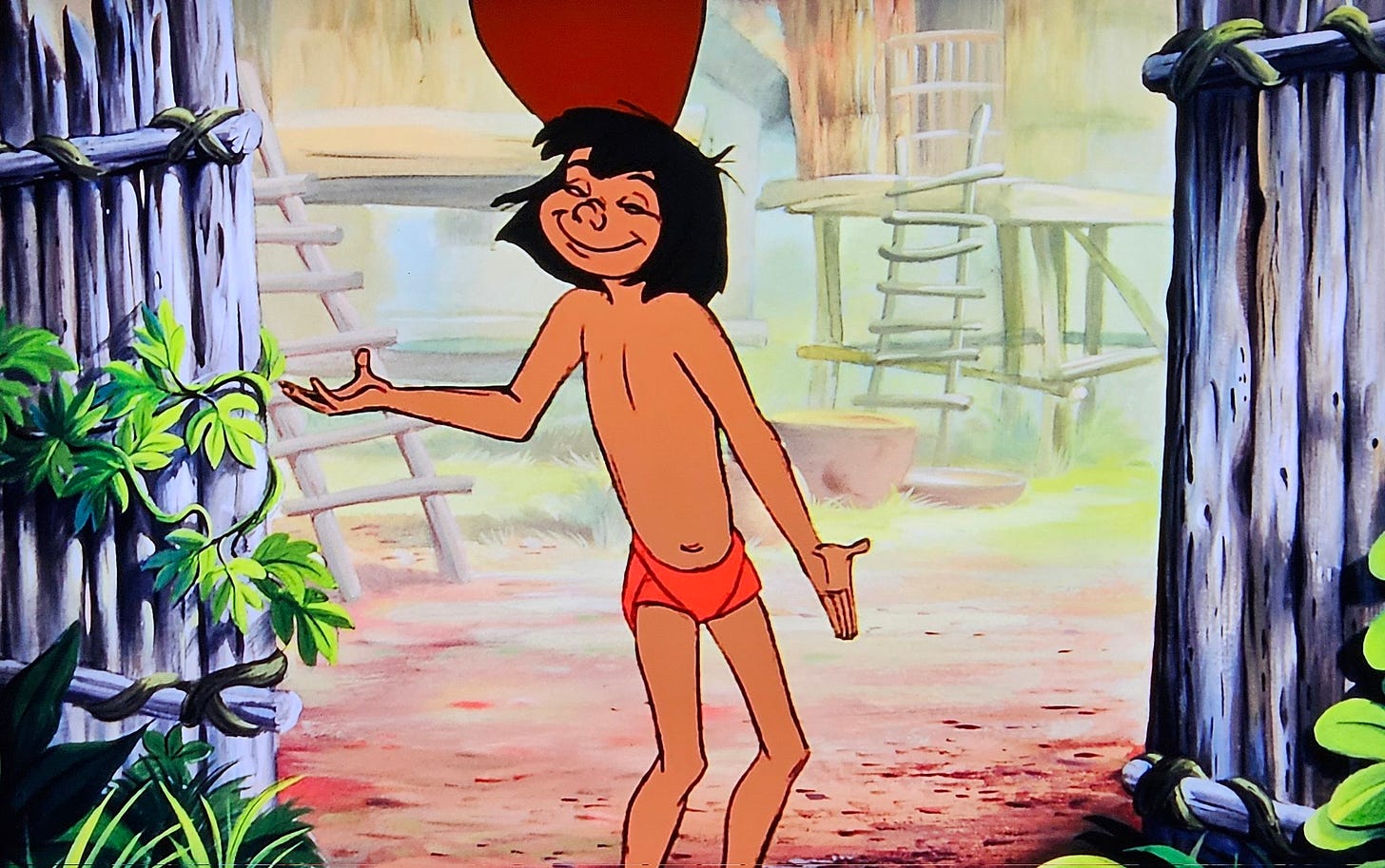Lessons from The Jungle Book
A Story of Identity, Maturity, and the Journey to Adulthood
I've been watching the 1967 Disney classic The Jungle Book with my 23 month old recently. Watching it so often, I couldn't help but see some valuable lessons in the film that are relevant to today's identity-obsessed climate.
I posted about this recently on X, but I'd like to expand more on the connections in this article.
1. A boy raised by wolves is not a wolf
Mowgli is found by the panther Bagheera and taken to live with the wolves, as the “man village” is too far for a baby to make the journey safely.
From there, we see Mowgli at ten, embraced by his wolf family, followed by a council of wolves holding a meeting in which they summon his adoptive father. They tell him that the tiger, Shere Kahn is coming and will surely kill the “man cub” because the tiger hates men. His adoptive father pleads with the head of the council not to banish Mowgli, but they refuse, saying that they are no match for the tiger and that Mowgli belongs in the man village for his safety.
No matter how much Mowgli or the wolves may wish for it not to be true, no matter how they raised him, the reality is undeniable - a boy raised by wolves is not a wolf. The impending threat of the tiger forces them all to be confronted by this in a way that disrupts the delusion. This feeds into the next point.
2. You can't avoid growing up and you can’t escape reality
And so, Mowgli is sent away with Bagheera. He begs Bagheera to take him back to the wolves. He doesn't want to leave them or the jungle, but Bagheera knows that the man village is the safest and best place for him.
“Shere Kahn is not going to allow you to grow up to become a man, just another hunter with a gun,” explains the panther.
Mowgli replies, “Aw, we'll just explain to him that I wouldn't do a thing like that.”
“Nonsense! No one explains anything to Shere Kahn!” the panther responds.
On the way, he tries to climb a tree to sleep in with Bagheera, but he realises he can't climb like a panther because he doesn't have any claws! The big cat helps him up. Mowgli asks again to stay in the jungle as Bagheera falls asleep, stating that he's not afraid and can defend himself.
Here, Mowgli is set upon by the snake—Ka—who immediately reminded me of ideological trans identified groomers the likes of Jeffery Marsh. He hypnotizes Mowgli and slowly starts squeezing him.
Ka slips and giggles, saying, “He won't be here in the morning,” waking Bagheera in time to save Mowgli.
Unfortunately, Ka works his hypnosis on Mowgli's guardian, but this distraction allows Mowgli to kick the snake out of the tree and both sleep soundly until morning.
No matter how much Mowgli thinks he can live in the jungle and can fight off the dangers alone, he can't. He's just a boy, and even adults can fall prey to predators. The reality is predators are lurking who are keen on keeping this boy from reaching the man village, just as there are predators like Marsh who are keen on keeping kids from reaching adulthood while trying to squeeze what they want out of them.
3. You can't force everyone to play along with your identity
Mowgli sees a herd of elephants marching by and tries to join up with them. Though the calf accepts him as another elephant, teaching him how to behave, the leader of the herd does not.
After realizing that Mowgli is a man cub, he demands that the boy leave his ranks. “I'll have no man cub in my jungle!”
Mowgli says, “It's not your jungle!” before Bagheera rushes in and assures the elephant colonel that he'll be taking the boy to the man village.
Satisfied by his assurances, the elephants leave and we can insert jokes about trans elephants being banned from the military.
Mowgli was right. This wasn't the elephant's jungle, but it's not his either. No matter how much he wishes to be an elephant, he can't be. Even if he pretended to be, no one else would have to play along. There is nothing he can do to change that.
4. You can't avoid responsibility or consequences
Mowgli tries again to literally cling to the jungle, and Bagheera tries to pull him back onto the path toward the man village. After an intense squabble, they part ways and Mowgli is found by Baloo, the bear.
Baloo is easy, breezy, and has a heck of a musical number! However, I urge you to not get caught up in the tune and pay close attention to the scene. Baloo nearly kills Mowgli by lifting a rock for the boy to snack on ants, but when Mowgli is still underneath the rock, Baloo lets go of it to dance off into the forest. Baloo doesn’t make sure or seem to care that Mowgli gets any food either, and he doesn't notice when the man cub is buried under a pile of bananas.
But Mowgli, like the audience, is too captivated by the song and Baloo's charm and fun nature to notice that his new friend is ignoring his needs. He believes that the life of a bear that Baloo is presenting is all fun and no consequences! Surely, being a bear is all Mowgli needs to do. So, he continues to follow Baloo until he is kidnapped by monkeys without Baloo noticing. Baloo is only awoken when the monkeys violently awaken him.
Baloo is a perfect example of glitter families: fun, encouragement, no allowance for nay-saying or reality. Baloo encourages Mowgli's delusion and doesn't even try to take care of him aside from relatively empty platitudes, much to the chagrin of Bagheera.
5. Stereotypes and actions don't make a man a man
The monkeys take Mowgli to King Louie the orangutan, and we get another catchy musical number! Again, I urge you to pay close attention to the scene and lyrics. If you can dance while you do that, then you'd have more luck than Mowgli.
He is so taken by the situation that he decides he wants to be a monkey, too! And, as luck would have it, King Louie wants to be a man so that he may become even more powerful. He tries to convince Mowgli to explain how to use guns and make fire, but Mowgli has no idea. King Louie doesn't believe him and tries to bribe Mowgli with bananas and promises of staying in the jungle.
Before the situation can get more intense, Baloo and Bagheera save Mowgli, and King Louie's kingdom crumbles around him.
King Louie thinks that if he can embody the stereotypes he believes make men, he'll become one. This is false, of course. Guns and fire don't make a human anymore than long hair and skirts make women. Men are men regardless of the tools they use or actions they take. Tools are tools, no matter who uses them. King Louie tried so hard to pursue his desire to be a man and the power he believed would come with it, the kingdom he had built fell to rubble.
6. Love is in honesty, not delusion
Bagheera and Baloo argue about taking Mowgli to the man village. The bear is flippant, having grown up in the jungle and Bagheera comments on how the bear isn't exactly a good role model. Baloo admires his black eye with reverence, and Bagheera reiterates that Mowgli belongs with his own kind, arguing that birds of a feather flock together. He asks if the bear would ever marry a panther, and Baloo jokes that he wouldn't know, as no panther ever asked him. He can't take the situation seriously.
Bagheera says that Shere Kahn will come to kill Mowgli because the tiger fears men's guns and fire. Baloo says that “Little Mowgli” doesn't have those things and Bagheera replies that the tiger won't care. “Shere Kahn won't wait until he does! He'll get Mowgli while he's young and helpless.”
Baloo realizes the danger and agrees that no matter what, he'll do what's best for Mowgli, but still can't bring himself to let him go. Baloo says that he “loves him like his own cub.”
To which, Bagheera replies with one of the most profound lines in the film - “Then think of what's best for Mowgli and not yourself.”
Baloo shows the same lack of sincerity about his life and any negatives, which is also common in the TQ+ online communities, right down to the flippancy around injury and even (disturbingly) interspecies relationships. But Bagheera knows how serious the realities are. Baloo is a bear and can survive the jungle. Mowgli is a human—a child—and he can't. He knows being honest about that is the best way to help the boy. He, unlike Baloo, loves Mowgli unselfishly. He wants Mowgli to be safe and flourish. Baloo, on the other hand, loves Mowgli only in a way that is self-serving. He likes being around Mowgli, but doesn't care or know how to actually take care of his needs. He just wants to keep Mowgli stagnant in the false belief that he's a bear because it's fun and validates his own lifestyle.
7. Children can't grasp the full reality of adulthood
When confronted by Baloo, Mowgli insists to him that he's a bear now, too. Baloo, not knowing how to find his own words to guide Mowgli to the man village, calls back to Bagheera's question about marrying a panther.
But Mowgli doesn't understand the question at all. He doesn't know a thing about marriage or romantic partnership because he's just a boy. He laughs at the question, not out of flippancy like Baloo, but because the whole idea of such things is beyond his current understanding. What even is romance? And who cares when you can live fun and carefree as a bear in the jungle?
Baloo is surprisingly disturbed by Mowgli's insistence on his bear identity and lack of understanding. He seems to finally understand this is not a flippant game for Mowgli, but real, and urges him to go be with his own kind in the man village.
They argue and Mowgli leaves.
Mowgli perfectly exemplifies why it is so dangerous for adults to project their flippancy onto children, as well as encourage false identities: they don’t have the same full understanding of—or even the capacity to understand—the world around them. To them, if a grown up says something is real and good, they believe it. They don't and can't question deeply or think far enough ahead to make plans or have considerations for adulthood. So, to Mowgli, the idea that he can't just continue life in the jungle as a bear is upsetting, and the thought of romance is a silly, alien concept. This is why children can't consent to fertility destruction and medicalization of an identity.
8. Predators make impossible promises
Ka finds Mowgli again, and when Mowgli closes his eyes and avoids his advances, the snake uses a common tactic we've seen from online groomers.
“Oh! You don't trust me,” he whines. Mowgli says no. The snake replies, “Then, there's nothing I can do to help.”
With Mowgli on the hook, Ka explains that he can be sure the boy never has to leave the jungle. We, as the adult audience, know that the snake means he will achieve this by consuming Mowgli. The man cub, however, thinks that the snake will make it so he can keep living in the jungle as he pleases.
Again, Ka captures Mowgli, but again, the snake is distracted—this time, by Shere Kahn—and Mowgli gets away.
This is a common thing that predators do to kids, adults, and the public at large: “I can give you what you want if you only just trust me enough so that I can get what I want.”
Here, what Mowgli wants is to maintain his childhood and avoid growing up. He's afraid of the unknown, and he's trying everything he can to avoid it, like claiming new identities. Ka promises that he can stay in the “jungle,” which is actually his childhood. We see this argument all the time from activists in the case of “puberty blockers” and childhood transition. They argue they can give children “more time to think” or “pause” puberty, but really, as with Ka, it's a means of robbing those children of something precious: a full life, maturity, and living as they are without having to pretend to be things they aren't.
9. Embracing reality is empowering
Mowgli, at his lowest, encounters a desolate swamp with vultures, and he feels alone with no friends who support his wishes to stay in the jungle. Vultures tease and eventually befriend him, saying that they've never met a creature they didn't like and that they'll be his friends until the very end. Again, as adults, we can see how this has a double and disturbing meaning. They're nice enough, but their song and presence actually signal the approach of doom. Here, Shere Kahn appears and confronts Mowgli!
Mowgli tries to put up a brave front, asking the tiger, “Why should I run?”
The tiger replies, “Everyone runs from Shere Kahn.”
The symbolism is strong here: “Everyone runs from Shere Kahn.” The tiger is not a predator, so much as an impending force. Be that responsibility, aging, or even the truth—at some point in most, if not every life, there comes a time when we are trying to run from something that we believe is a threat in some way, even if it's small.
However, given that he's in this swamp, surrounded by vultures just beforehand, we can see very clearly the existentialism that Mowgli has been trying to run from. The rest of the film is colorful: the jungle is full of life! But here, Mowgli has lost everything—the familiarity and comfort of the only home and family he's ever known, his friends, and even his innocent understanding of danger and safety. And here he is, facing the thing that had driven him away from all of those things in some way or another. This is his most visceral confrontation with the danger of trying to avoid reality, and he unfortunately finds that reality has very real claws.
Thankfully, his friends help him take the offensive. The vultures tell Mowgli to grab a flaming branch. He could not defeat the beast with tooth and claw and could only do so with one of the tools of man: fire. This signals his acceptance of manhood, of the reality that he is a human.
10. Growing up isn't scary after all
Allowed to grow, mature, and feel empowered by embracing manhood, Mowgli can finally open himself to the possibility of integrating into the man village/adulthood/society.
He hears the siren's call, so to speak, of a girl singing about the roles of men, women, and her own role as a growing girl in the village. And, for your next viewing of the film, note that an instrumental version of her song plays throughout the film, noting moments where the jungle and the man village are conflicting in Mowgli's life.
The lyrics are as follows:
Father's hunting in the forest.
Mother's cooking in the home.
I must go to fetch the water,
‘til the day that I am grown.
As Mowgli is listening to her from a tall tree, the branch snaps, and he falls into the water. He backs away from her at first, but eventually follows her when she starts to walk away. She knowingly drops her water vessel, spilling and emptying it. Mowgli fills it for her and follows behind her.
Her lyrics change after he falls in the water
And I will have a handsome husband,
And a daughter of my own.
And I'll send her to fetch the water,
I'll be cooking in the home.
Mowgli follows her into the village to the chagrin of Baloo who tries one last time to call him back. Bagheera urges him forward, and with a shrug, Mowgli turns and happily enters the village. Baloo and Bagheera are both ultimately happy for him and the film ends.
Again, this symbolism is strong. In going to fetch the water, the girl fetches (assumedly) a husband in Mowgli. He fills her water vessel, which is historically a representation of female fertility, of the womb. He dutifully follows, happily leaving behind the jungles of childhood because he has been able to fully grow into and accept the reality of his manhood—the same journey that most people will naturally take: growing into adulthood and finding a partner to have their own children.
Although the film is an extremely compacted journey of child to adult, it is loaded to the brim with valuable lessons and meaning beneath its catchy tunes and charming animation. It has been a pleasure to see this all in a new light with my daughter, and I hope that my analysis adds more to your future screenings and even prompts or inspires new ways to cover sensitive topics with your own children. May we all have the persistence of Bagheera to see them through.
And whether you're an elephant or not, never forget that it doesn't matter if a man cub identifies as a wolf, a panther, an elephant, a bear, or a monkey. Man cubs are humans, and that doesn't change. There's more power in embracing that than there ever will be in trying to fight it.


